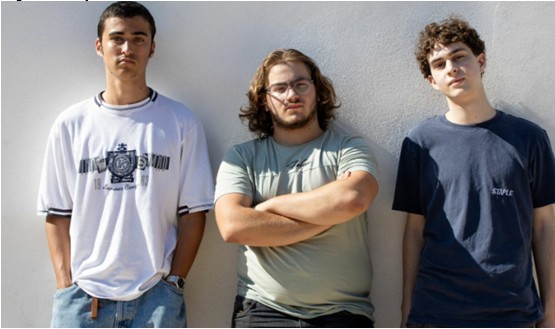A demonstration was held Monday morning, August 5, in front of Tel-Hashomer enlistment camp in support of three teens refusing to enlist in the occupation army in protest the war in Gaza. The demonstration was organized by the Mesarvot network and Yesh Gvul movement.

Oryan Mueller, Itamar Greenberg and Yuval Moav (Photo: Mesarvot)
The three 18-year-olds, Yuval Moav from Kfar Netter, Itamar Greenberg from Bnei Brak, and Oryan Mueller from Tel Aviv, refused to enlist in the Israeli army in protest of the ongoing occupation of the Palestinian territories and the war in Gaza. The three teens are expected to be tried and sent to prison.
Earlier, clashes take place near the recruiting office at Tel Hashomer, as hundreds of ultra-Orthodox men protest the intention to draft members of the community. Footage from the scene shows scuffling between the demonstrators and police. They called: “To prison and not to the army.” The protest erupted after the army ordered 1,200 ultra-Orthodox men to arrive at the base and begin the process of enlisting in the army. Senior Haredi spiritual leaders have forbidden their disciples from coming.
On Sunday, Yuval Green, a former soldier, published a public letter in support of three teens refusing to enlist: “I’ve always had moral conflicts regarding my service. They were inevitable, stemming from the everyday injustices carried out by our military in the West Bank, or from serving in Hebron myself, a city where Israel’s unjust policies are at their most visible. Only after I finished my mandatory service, with the guidance of the ‘Freedom School’ program I participated in, I began my journey learning more about the history of our conflict and began questioning some core beliefs that so many Israelis hold, recognizing much denied hard truths, regarding the historic wrongs Israel has dished out to the Palestinians. In the process, I began to question the strongest Israeli consensus: that of the military.”
“Before the shock of October 7th, I was already on the path to becoming a refuser. I was planning to leave my unit, where I served for years alongside close friends, by telling my friends that I was leaving after the holidays. When the war suddenly broke out, a day before I planned to leave, it changed everything. I was shocked, as anyone else, to hear about the horrific massacre Hamas carried out on the 7th. And when my unit was recruited, I joined them; I could not leave my friends as their medic. I felt that I needed to help guard the innocent civilians that were attacked in their homes.”
“At the war’s outset, I was serving in some of the Israeli towns that were destroyed during the attack. We witnessed houses burned down, cars punctured from bullets, destruction everywhere. Nearly everyone I know, including myself, lost someone that was close to them, most of which were unarmed civilians. Those traumatic events have brought Israeli public opinion to the darkest point I’ve ever seen. Denying the very existence of innocent civilians has become mainstream and demands to ignore international law and abandon all past restraint grow louder. Ten months into the war, the realization of those ideas into government policy has become clear.”
“The level of destruction I saw in Gaza was beyond all imagination. Daily Israeli bombings killed countless civilians, and even some of our own hostages while destroying all of Gaza’s infrastructure. As time went by, my qualms grew larger, especially when I went inside Gaza myself, while Israel chose to refuse a hostage deal in exchange for ending the war.
Our daily lives in Gaza were carried out in people’s homes, where I felt the absence of the Palestinian families who were forced to flee, and I was left sitting among their belongings. We used those homes to protect ourselves from Hamas’s snipers, but tactical decisions ended up mixing with soldiers’ sentiment of revenge: the homes we stayed in were vandalized, graffiti was done, and small souvenirs were taken from each home. When my commanding officer ordered us to burn down the house we stayed at, justifying his orders with military reasons not nearly legitimate enough to take away the home of a few families, I declared that I’m not willing to participate and left.”
“The day-to-day reality I witnessed on the ground, as time went on, with the hostages still in captivity reminded me that when given the option, Israel is only willing to resort to military force. This was on full display well before the invasion of Rafah, and only further underscored on numerous occasions by an Israeli government unwilling to end the war in exchange for the hostages. When the nation can use other tools at its disposal – diplomatic, for one – it’s not ready to do so, even against popular will. For Netanyahu, whatever plan exists to save the hostages is merely a selling point, even if that means reducing the lives of the remaining hostages to a PR strategy.”
“My experiences in Gaza, those from before the war, and the sights we’ve seen after the 7th of October massacre, have all led me to believe that militarism is only a source of pain, for both Palestinians and Israelis. I’m Israeli and I consider myself pro-Palestinian and know that the establishment of a Palestinian state is the only just solution to the occupation. The tragic massacres on October 7th cannot be justified. Never. Exactly as the destruction we’re now seeing in Gaza cannot. That’s why I believe in differentiating between supporting the Palestinian people and supporting Hamas, violence or intifada. Not only is violence never justified, Hamas and its horrific actions have only brought destruction upon Gaza. In the name of nonviolence, I also believe that war refusal offers hope. Not only to end the assault on Gaza, but to also rehabilitate communities in the ‘Gaza envelope’ by breaking the endless cycle of suffering.”
Related: https://maki.org.il/en/?p=31973


